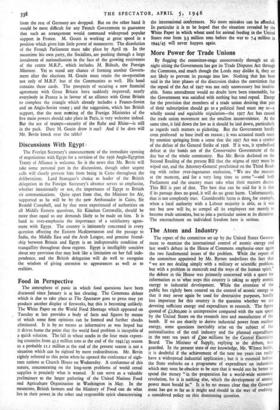More Power • for Trade Unions
By flogging the committee-stage unnecessarily through an all- night sitting the Government has got its Trade Disputes Act through the Commons, and much though the Lords may dislike it, they are not likely to prevent its passage into law. Nothing that has been said in the later phases of the discussion shakes the conviction that the repeal of the Act of 1927 was not only unnecessary but inadvis- able. Some amendment would no doubt have been reasonable, but the Government was satisfied with nothing but total repeal. Except for the provision that members of a trade union desiring that part of their subscription should go to a political fund must say so—a wholly sound and equitable stipulation—the 1927 Act has caused the trade union movement not the smallest inconvenience. At the
same time, it laid down the law as it should be laid down, particularly as regards such matters as picketing. But the Government hardly even professed to base itself on reason ; it was actuated much more by emotion springing from a sense that the 1927 Act was a symbol of the defeat of the General Strike of 1926. If it was, it symbolised defeat at the hands not of the Conservative Government of the day but of the whole community. But Mr. Bevin declared on the Second Reading of the present Bill that the stigma of 1927 must be wiped out, and the Attorney-General proclaimed on the Third Read- ing with rather over-ingenuous exaltation, " We are the masters at the moment, and for a very- long time to come "—and both Parliament and the country must take what their masters decree. This Bill is part of that. The best that can be said for it is that if its passage does no good, it will do no great harm. Unfortunately, that is not completely true. Considerable harm is done; for example, when a local authority with a Labour majority is able, as it was not but now will be, to compel all its employees not merely to become trade unionists, but to join a particular union at its dictation. The encroachment on individual freedom here is serious.






























 Previous page
Previous page